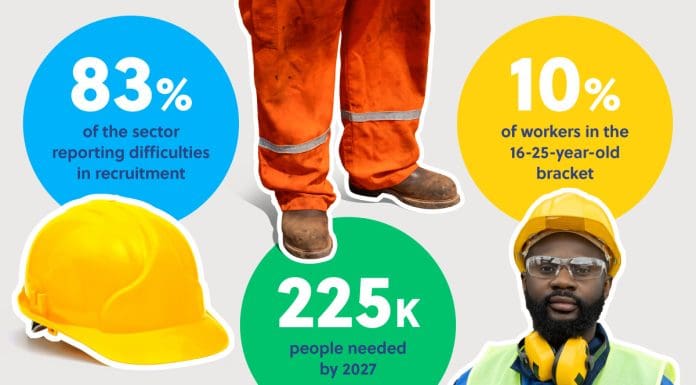Problems with recruitment and retention in the construction industry have been a topic of discussion for some time, with 83% of the sector reporting difficulties. It’s the kind of thing that we at Re-flow look at with sympathy, and never more so than when we hear related stories from our clients on the topic, or when we visit trade shows and listen to some of the experts
Our mission, to provide companies working in infrastructure with a world-class field management solution, has one clear eye on the future – on helping companies streamline and improve compliance and general profitability.
But an ageing workforce and a lack of young people interested in joining the sector – along with issues like Covid and the long-term effects of Brexit – have all played a part in a growing skills gap and an increasing need for new workers in the here and now.
According to the Fuller Working Lives in Construction Report, conducted by the Construction Industry Training Board (CITB):
“The sector is caught in a vice, squeezing the employment market at both ends – with fewer people available for work in the younger age groups and earlier leaving and retirement in the older age groups.
“People, and more importantly skills, lost to retirement or for other reasons represent a double blow for employers.
“Employers are finding it increasingly difficult to recruit enough younger staff with the right levels of skill.”
Solutions to the recruitment problem
CITB’s New Perspectives on Recruitment to the Construction Industry Report outlines six main ways to improve the situation:
Increasing the visibility and awareness of construction
Emphasising the strengths of the industry
Targeting recruitment
Trying different attraction approaches
Working to change perceptions
Adjusting employment practices and changing the pervasive macho culture.
Re-flow attended the 2024 RSMA Annual Conference in order to learn more about these issues. We found the talks fascinating, if also concerning.
Julie Davidson (head of quality, safety, health & environment at Jointline), Danny O’Reilly (contracts manager at Hi-Way Services), Cathryn Greville (head of fairness, inclusion & respect at Supply Chain Sustainability School), Stephen Cole (senior customer engagement manager at CITB), and Nathan Wilkins (customer engagement manager at CITB) had a panel discussion on unlocking the value of people in the road-marking industry.
The discussion focused on the need to educate young people about the benefits of working in the sector, and also covered the previously mentioned risks of an ageing workforce and loss of skills.
According to International Policy Digest: “For the past several years, unemployment rates for virtually every type of blue-collar worker, from managers all the way down to entrylevel, low-skilled workers, have risen steadily. It’s essential to note that, over the same period, the number of people with a bachelor’s-level degree has skyrocketed. In other words, there are now more jobs available than there are people who are willing or able to fill them.”
Traditional blue-collar roles are less appealing to tech-driven younger generations. The perception of what makes a ‘good’ job has changed, with many young people, having stayed in education for longer, seeking high-paying white-collar jobs.
“…an ageing workforce and a lack of young people interested in joining the sector – along with issues like Covid and the long-term effects of Brexit – have all played a part in a growing skills gap and an increasing need for new workers in the here and now.“
The stats don’t lie
With 225,000 people needed by 2027, a quarter of the current workforce within 10 years of retirement and only 10% of workers in the 16-25-year-old bracket, a change is needed to help the industry move forward.
Julie Davidson talked about the need to increase the attractiveness of the industry to potential recruits. She said there were challenges to overcome: the long, unsocial working hours, time spent away from family and the pressure to keep up with physical demands of work.
Julie said that being upfront on these issues can often scare off potential employees, but that being truthful and matter of fact is a quality most people in the industry appreciate.
Nathan Wilkins added that it was important to make people feel safe, and that making employees feel seen and heard leads to better retention rates.
A fresh perspective
Stephen Cole spoke about how best to retain and develop people. He said that the four pillars to good working conditions were:
Fair pay and conditions
Workplace wellbeing
Skills and progression
Diversity and recruitment
He suggested that younger generations want to share the same values as their employer, and rate this as a key factor when considering a role.
“It is important to individuals regardless of sector. Key values influencing these career decisions are: stability in where and who you work for, having pride in your work, helping others, making a difference and a flexibility in work hours.”
Re-flow’s take is that bringing more people into construction is a great thing, but if there are poor incentives and substandard working conditions then recruits won’t stay.
Knowing why workers are leaving is essential. With this information we can improve culture and retention and get the industry back to a healthier state.
Plenty of work needs to be done in recruitment and retention across the industry, and events like the RSMA Annual Conference offered an opportunity to share knowledge and ideas, and to come up with solutions for these ongoing issues.
And, as always, Re-flow will be there to help in any way that we can.
Ashley Wing
Head of Sales & Marketing
Re-flow Field Management
Tel: +44 01392 547002
*Please note: This is a commercial profile.
The post Re-flow: Recruitment and retention – RSMA Annual Conference addresses issues in the employee pipeline appeared first on Planning, Building & Construction Today.


